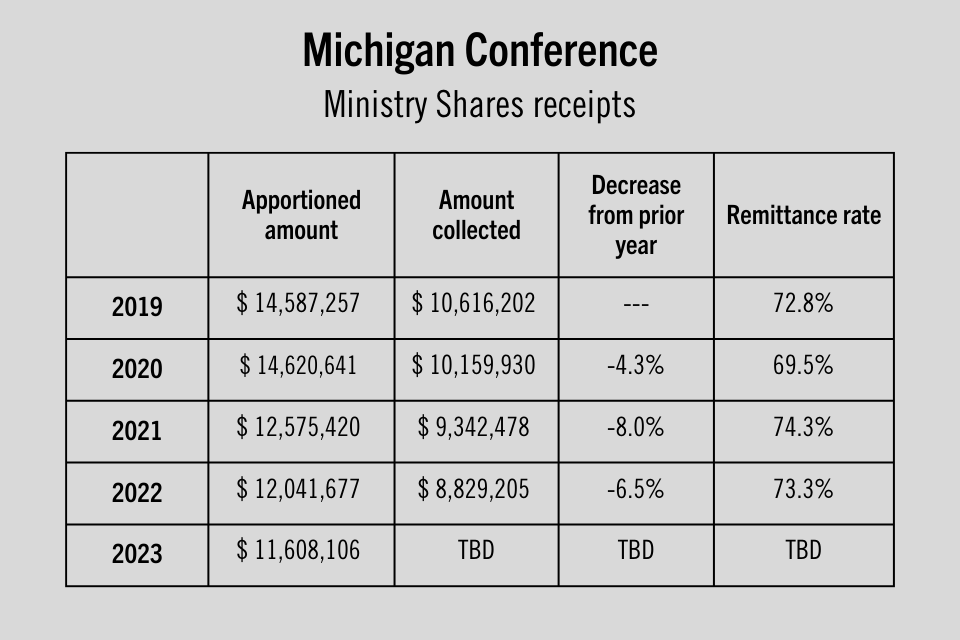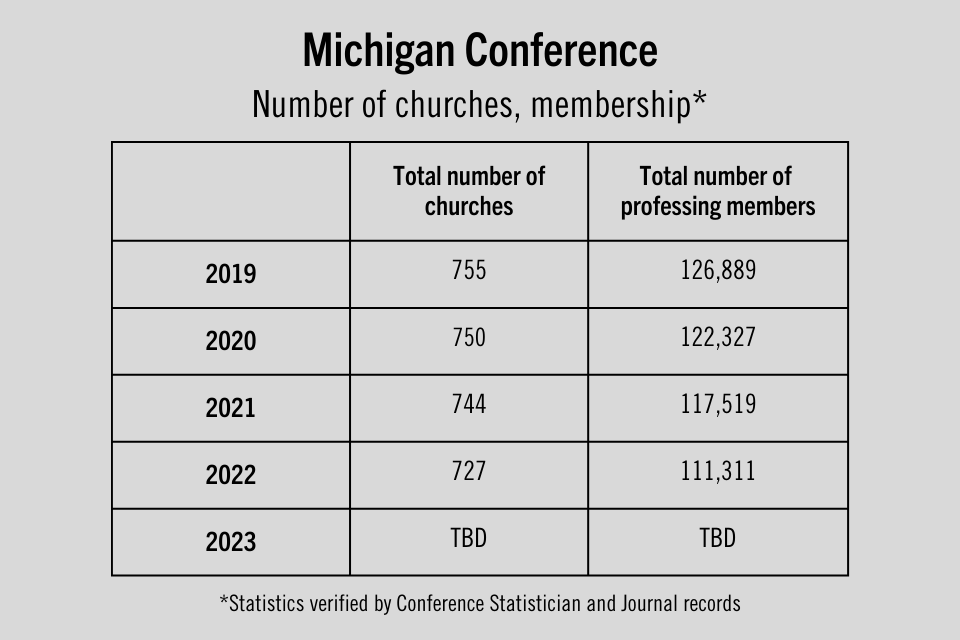The Michigan Conference announces program staff restructuring, reductions, and reassignments needed to meet budget projections for 2024.
JAMES DEATON
Content Editor
Following decades of decreased Ministry Shares receipts, the Michigan Conference has announced program staff restructuring, reductions, and reassignments needed to meet budget projections for 2024. The announcement means that there will be 10 fewer program staff positions by Jan. 1, 2024.
Last week, Bishop David Bard sent an internal memo notifying staff of the forthcoming changes and the painful decisions that had to be made to meet next year’s budget. “This is a difficult time for all of us serving the Michigan Conference,” he said. “These are difficult decisions to make and I invite you to pray for those impacted by this announcement.”
The Michigan Conference’s Council on Finance and Administration has projected a $9.4 million budget for 2024, a reduction of $2.2 million from this year’s $11.6 million budget. Although the projection is preliminary since 2024 apportionment figures from The United Methodist Church’s General Council on Finance and Administration (GCFA) are pending, the giving trend is sobering. It reflects how local congregations are currently struggling in the wake of a devastating pandemic and the decline in worship attendance and overall participation that it exacerbated.
United Methodists in Michigan are generous, giving more than $8 million each year through congregational Ministry Shares, but not every church is budgeting for this shared financial responsibility. The conference assigns each Michigan United Methodist church Ministry Shares, also known as apportionments, as that church’s fair share of the combined ministry.

Ministry Shares are the financial lifeblood of the Michigan Conference, sustaining mission and ministry here in the conference and around the world. Seventy-five percent of giving stays in Michigan to fund clergy support, conference administration, and conference benevolences, with 25% going to General Church apportionments to assist global connectional mission.
However, the steady decline in congregational Ministry Shares combined with decreased church membership and the projected reduction in the number of churches due to closures, consolidations, and disaffiliation has led leadership to create a more realistic budget for 2024.
The drastic adjustment of finances is something other denominational bodies are also wrestling with. Last November, GCFA began preparing a denomination-wide budget for 2025-2028, to be approved at the 2024 General Conference (GC), which is a reduction of more than 38% from the budget approved in 2016. This is the lowest budget to come before GC since 1984.

Other factors impacting the 2024 budget include the end of generous grants/loans given through the U.S. federal government’s Payroll Protection Program and the impact of the COVID-19 pandemic on local churches and worship attendance, which research shows is on the decline throughout the United States. This decline has been mitigated partly due to the birth of new ways of gathering and connecting, thanks to technology and increased online worship participation. The Michigan Conference is even charting new territory through the creation of its first online-only church.
Since the Michigan Conference’s creation on January 1, 2019, leadership has been tracking all these trends and carefully managing changes to the annual conference budget as constraints have been implemented. The closing of most of the district offices (only two have physical office space) and the move of most staff to work at home due to COVID-19 were instrumental in cutting overhead costs. The reduction in the number of districts from nine to seven, to take effect July 1, 2023, is another recent decision.
This week’s announcement represents a decline of nearly 30 staff positions since 2019, but almost all of those have been made through retirements or reappointments within the conference if a staff member is an elder or deacon. This year’s staff changes include the retirements of Rev. John Hice and Rev. Dr. Jerry DeVine, district superintendents who are retiring at the 2023 Annual Conference and won’t be replaced because of the forthcoming redistricting. In addition, three district executive assistants—Jill Haney (Northern Waters), Dar McGee (Heritage), and Cheryl Rentschler (East Winds)—have retired or will retire this year. Jodi Fuller, who served as the Congregational Vibrancy Executive Assistant, is now the East Winds District Executive Assistant.
Previously the conference has been able to absorb budget decreases through these various measures to minimize the disruption to the lives of individuals and families and not cut staffing. Unfortunately, according to Bishop Bard’s memo to staff, “we are not able to do that this time.”
The reductions in staffing are part of a broader restructuring of the conference program staff. On July 1, 2023, staff in both the Connectional Ministries Office and the Congregational Vibrancy/Leadership Development Office will begin the transition of restructuring into a single Program Staff Team, shifting from the current specialist-based model to a team-based model by January 1, 2024. The staggered transitions and the longer lead time will benefit those staff members involved and the future of their ministries.
The Program Staff Team will design, implement, and evaluate a limited number of common initiatives aligned with the Michigan Conference’s strategic directions and priorities in order to meet goals and outcomes set in consultation with the Conference Leadership Council and conference directors. Conference leadership will ensure the Program Staff Team’s work is carefully aligned with the Michigan Conference’s vision of equipping and connecting through Christ-centered mission and ministry, bold and effective leaders, and vibrant congregations. The goal is to ensure that remaining staff will be able to manage realistic workload priorities.
The Program Staff Team will consist of a lead, an executive assistant, and three additional members. Laura Witkowski will serve as the lead. Sus’ann Busley will serve as the executive assistant. Lisa Batten, Naomi García, and Rev. Kathy Pittenger will serve as staff members.
Beginning July 1, 2023, the Director of Connectional Ministry and Director of Congregational Vibrancy positions will end. Administrative responsibilities from these positions will be included in a restructured Clergy Assistant to the Bishop and Director of Connectional Ministry position. Rev. Dr. Jennifer Browne will serve in this role.
Rev. Paul Perez, currently serving as Director of Connectional Ministry, has been appointed as Clergy Leader at Detroit: Central UMC beginning July 1, 2023. Rev. Dirk Elliott, currently serving as Director of Congregational Vibrancy, will serve from July 1 to December 31, 2023, as a special assistant to the bishop and cabinet in the area of congregational development. While the precise title and job description are to be determined, this position will focus on the transition of the work of congregational vibrancy to the cabinet and the new Program Staff Team.
The Associate Director for Multi-Cultural Vibrancy position will end on June 30, 2023. Rev. Brittney Stephan is returning to the Indiana Conference to serve as Associate Pastor at Noblesville: First UMC. The Mission and Justice Coordinator position will continue until December 31, 2023. This work will continue to be led by Rev. Alice Townley. The Youth Ministry Initiatives Coordinator position, staffed by Rev. Christina Miller White, will end this summer. The Coordinator of Latinx Ministries position, staffed by Sonya Luna, will end this summer.
A severance package will be offered to each staff member who is eligible. In addition, the conference has retained a consultant to provide transitional support to those departing and to those remaining and restructuring.
In his concluding comments to conference staff, Bishop Bard was honest about the impact of this announcement on staff members and their families. Still, he sounded hopeful that these difficult decisions will allow the Michigan Conference to move forward into the next chapter of ministry together.
He said, “Together we continue to help people find meaning for their lives in the grace of God offered in Jesus Christ. We continue to support local churches in their quest toward being vital and vibrant centers of mission and ministry. We cooperate to accomplish work none of our individual churches alone could accomplish. We are cultivating and supporting bold, courageous effective leaders. That work brings me joy.”
Last Updated on March 14, 2023

